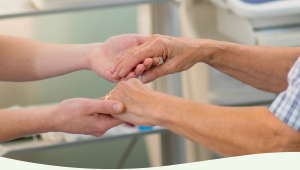Joint Injections
What is a joint injection?
A joint injection is an injection of a steroid or other medication into a joint, which is any place two bones move against each other and are surrounded by a joint capsule. Joint injections are designed to treat and relieve pain associated with damaged or diseased joints. Injection of corticosteroids can help reduce the inflammation, possibly preventing tissue damage and scarring, as well as decreasing pain and restoring function.
How is the joint injection done?
It is done with the patient in whatever position allows the best access into the joint. Xray fluoroscopy or ultrasound guidance may be used. The skin is cleaned with antiseptic solution and then a mixture of local anesthetic (numbing) and steroid (longer term anti inflammatory) is administered via injection. A bandage is applied if necessary.
How effective is a joint injection?
It is sometimes difficult to predict if the injection will indeed help you or not. Those who have recent onset of pain or milder pain may respond much better than the ones with longstanding or severe pain. Immediately after the injection, you may feel less pain. This is due to the numbing effect of the local anesthetic injected. This will last only for a few hours. Your pain will return and you may have a sore joint for a day or two. You should start noticing pain relief starting the 3rd to 5th day or so.
What are the risks?
Joint injections are relatively safe and simple procedures that can be performed as an outpatient. Potential complications of joint injections include: injection-site pain, temporary pain “flare-ups”, infection, bleeding, changes in skin color or sensation, and soft tissue weakening and bone degeneration. The other risks are related to the side effects of steroids including flushing, weight gain, increase in blood sugar (mainly in diabetics), water retention, suppression of body’s own natural production of cortisone and suppression of the immune system.
Who should not have a joint injection?
Patients who have an allergy to any anesthetic, are on blood thinning medications, are diabetic, have an active infection, or are pregnant should consult with the pain physician before receiving the procedure. There may be special instructions or lab testing or the procedure might need to be rescheduled.
What happens afterwards?
You may want to have a ride home. We advise the patients to take it easy for a day or so after the procedure. You may want to apply ice to the affected area. Perform the activities as tolerated by you. Unless there are complications, you should be able to return to work the next day.
Is a joint injection right for you?
If you have chronic pain from an arthritic joint despite oral medications and/or physical therapy, you may benefit. Contact us for more information!
At PrairieShore™ Pain Center, our goal is to relieve your pain and improve your quality of life. If your primary physician has advised you to see a specialist for your pain, turn to us for help. To schedule your appointment, please contact us here or give us a call at (847) 883-0077.







